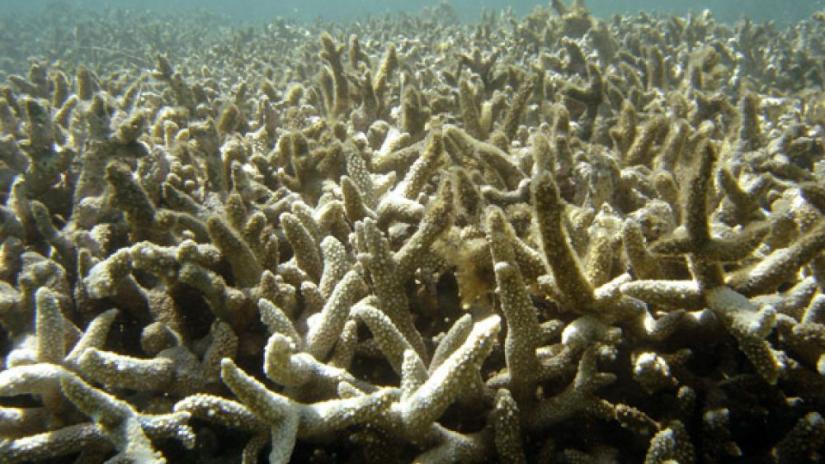 Heat extremes on the high seas are on the increase, with ocean heat waves disturbing ecosystems in two hemispheres and two great oceans, US scientists report.
Heat extremes on the high seas are on the increase, with ocean heat waves disturbing ecosystems in two hemispheres and two great oceans, US scientists report.
And these same sudden rises in sea temperatures don’t just damage coral reefs, they kill the corals and start the process of reef decay, according to a separate study by Australian researchers.
Andrew Pershing of the Gulf of Maine Research Institute and colleagues report in the Proceedings of the National Academy of Sciences that they examined data from 65 marine ecosystems over the years 1854 to 2018 to work out how frequently ocean temperatures suddenly rose to unexpected levels.
They found such deviations from the average in the Arctic, North Atlantic, eastern Pacific and off the Australian coasts. They expected to find evidence of occasional hot flushes. But they did not expect to find quite so many.
“Across the 65 ecosystems we examined, we expected about six or seven of them would experience these ‘surprises’ each year,” Dr Pershing said. “Instead, we’ve seen an average of 12 ecosystems experiencing these warming events each year over the past seven years, including a high of 23 ‘surprises’ in 2016.”
Intense and sudden changes in sea temperatures affect crustaceans, algae, corals, molluscs and many millions of humans who depend on the oceans for income. And a new study by researchers from Australian universities reports that even a rise of 0.5°C is reflected in deaths during an outbreak of coral bleaching.
Corals live in symbiosis with algae: ocean warming periodically disturbs this normally beneficial relationship. The coral animals evert (turn out) the algae and once-lurid reefs will bleach, and become more vulnerable to disease.
Corals support the world’s richest ocean ecosystems so such changes are a challenge, both to the survival of biodiversity and to local incomes from the tourism linked to the beauty of the reefs.
Very warm water
“What we are seeing is that severe marine heatwave events can have a far more severe impact than coral bleaching: the water temperatures are so warm that that the coral animal doesn’t bleach – in terms of a loss of its symbiosis – the animal dies and its underlying skeleton is all that remains,” said Tracy Ainsworth of the University of New South Wales.
The researchers report in the journal Current Biology that they used computer tomography scanning techniques to explore the marine destruction. In 2016, more than 30% of the northern part of Australia’s Great Barrier Reef experienced temperatures higher than those in which corals can survive.
“We find that the skeleton is immediately overgrown by rapid growth of algae and bacteria,” said Bill Leggat of the University of Newcastle, a co-author.
“We show that this process is devastating not just for the animal tissue but also for the skeleton that is left behind, which is rapidly eroded and weakened.”
 Others
Others
30839 hour(s) 23 minute(s) ago ;
Afternoon 06:18 ; Tuesday ; Apr 23, 2024
Ocean heat waves damage reefs, kill coral
Send
Climate News Network
Published : 04:00, Aug 14, 2019 | Updated : 04:00, Aug 14, 2019
Published : 04:00, Aug 14, 2019 | Updated : 04:00, Aug 14, 2019
0 ...0 ...
/hb/
Topics: Top Stories
- KOICA donates medical supplies to BSMMU
- 5 more flights to take back British nationals to London
- Covid19: Rajarbagh, Mohammadpur worst affected
- Momen joins UN solidarity song over COVID-19 combat
- Covid-19: OIC to hold special meeting
- WFP begins food distribution in Cox’s Bazar
- WFP begins food distribution in Cox’s Bazar
- 290 return home to Australia
- Third charter flight for US citizens to return home
- Dhaka proposes to postpone D8 Summit
Unauthorized use of news, image, information, etc published by Bangla Tribune is punishable by copyright law. Appropriate legal steps will be taken by the management against any person or body that infringes those laws.
Bangla Tribune is one of the most revered online newspapers in Bangladesh, due to its reputation of neutral coverage and incisive analysis.
F R Tower, 8/C Panthapath, Shukrabad, Dhaka-1207 | Phone: 58151324; 58151326, Fax: 58151329 | Mob: 01730794527, 01730794528


